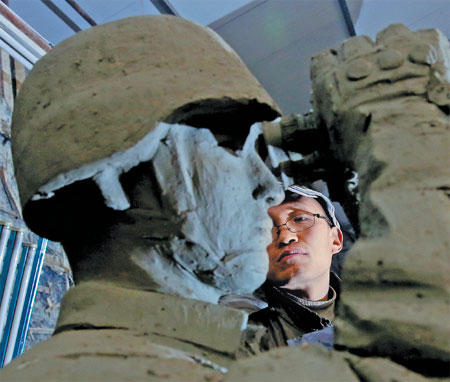
Many of the artworks produced in Beijing's Heiqiao art zone are public sculptures that will dot the country's new urban centers. [Photos by Jiang Dong / China Daily]

Craftsmen in Beijing's art zones work hard to develop their trade despite a struggling global economy. Wang Ru chats with the makers of our monuments.
In a factory workshop in northeast Beijing's Heiqiao art zone, a group of workers has nearly finished a set of clay sculptures, including three 5.5-meter-high horses and a giant statute of Genghis Khan.
Zhang Bao, 31, with his blue jacket spattered with clay, uses a laser pointer to direct his workers climbing on the iron supports around the statues.
The artworks are for a local government sector of the Inner Mongolia autonomous region - once the cradle of Genghis Khan's formidable empire.
The contract price of the sculptures is about 10 million yuan ($1.6 million), but Zhang and his team will only get a tiny slice of the pie.
The heating system in the workshop doesn't work. The only heat is from a coal stove.
"It is to prevent the clay from being frozen, not for our warmth," Zhang says. The quality clay is more expensive than flour, he adds.
The sculptures will consume eight tons of clay. The final process will be to cast copper on the surface after the clay work is done.
Beijing is a major hub where thousands of sculptures are assembled in "art zones". Most are in abandoned factories and suburban villages, such as Heiqiao, 798 art zone and Songzhuang village.
